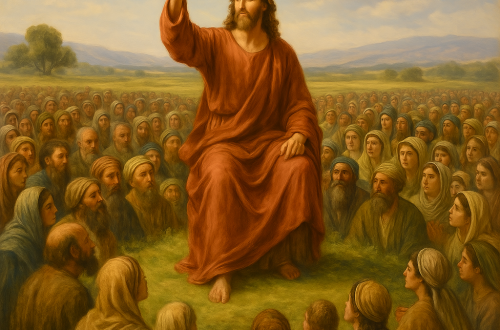
Is it me who crucified Jesus

When he touches me with his spirit my heart begins to cry because I feel which pain, I caused him with my sins
When I look to the cross, I see What I have do ne with my life Disobeying and destroying casting away his grace
Is it me who crucified Jesus Is it me who put the nails in his hand Is it me he was praying for on the cross Father forgive they do not know what they’re do ing
And the sin in my life was changing me I did not know what I did but this is no excuse to refuse the grace he wanted to give me
Now I am bowing my knees before him praying father forgive me Receiving the gift of his salvation of his grace never-ending.
How do the concept of sin influence our understanding of morality and the consequences of our actions?
When we talk about sin, we talk most about moral sins.
But the problem with moral sins is, that the sins we consider as moral sins can change, because a moral sin is something that is attractive but forbidden. First I have to make a law that says that something is forbidden, than the act to break this law makes it a sin.
I give an easy example for to illustrate the topic, even it has nothing to do with a moral or spiritual sin.
When I have a weight loss plan and I eat a cream cake, than it will be a sin for me. The consequence is, that I don t reach my weight goal. Even if I do it in secret, the doctor will see it, when he controls my blood.
If there would be no weight loss plan, than there would not be a sin.
Paul explains this concept of sin in the epistle to the Romans 7:
7 What shall we say then? Is the law sin? God forbid. Nay, I had not known sin, but by the law: for I had not known lust, except the law had said, Thou shalt not covet.8 But sin, taking occasion by the commandment, wrought in me all manner of concupiscence. For without the law sin was dead.9 For I was alive without the law once: but when the commandment came, sin revived, and I died. 10 And the commandment, which was ordained to life, I found to be unto death
God gave laws to the human being, for to make society save, for to protect the weak in the society and that they all may have succeed in their life on earth and to protect creation.
But today we make our life easier: We eliminate laws and commandments God gave us and we eliminate the consequences for doing the wrong by not punishing them as we should.
But by doing this, we lose our moral standards.
The consequences are war, destroyed families, climate change and an increasing rate of criminality and corruption in many countries
Is it possible to fully comprehend the extent of our wrong doings and their impact on ourselves and others?
First of all, even we set down the moral standards in our behavior we all know what is right or wrong.
Paul writes in epistel Romans 2 that we all have a conscience and those who never heard about Gods laws have the law written in their hearts.
14 For when the Gentiles, which have not the law, do by nature the things contained in the law, these, having not the law, are a law unto themselves: 15 Which shew the work of the law written in their hearts, their conscience also bearing witness, and their thoughts the mean while accusing or else excusing one another;
But there is one difficult point: We are not honest.
The normal case is, that we have a very good self-image, even if somebody says he has no self-esteem, we all think that we are good people.
John says in 1. John 1-8-9
8 If we say that we have no sin, we deceive ourselves, and the truth is not in us. 9 If we confess our sins, he is faithful and just to forgive us our sins, and to cleanse us from all unrighteousness.
We are not honest, because we don t want to admit, that we all are sinners.
David says in Psalm 51,5
5 Behold, I was shapen in iniquity; and in sin did my mother conceive me. *
Paul wrote in Roman 3
23 For all have sinned, and come short of the glory of God;
Even we are on the outside a nice and good person, in the inside lives the sin and we have to be cleaned by the blood of Jesus when we receive him as our savior, because we have inherited sin from the first human Adam.
Rom 5,12
If we want to comprehend our wrong doings honestly, we need the Holy Spirit and the Word of God which are convincing us that our nature as human beings are full of sin:
12 For the word of God is quick, and powerful, and sharper than any twoedged sword, piercing even to the dividing asunder of soul and spirit, and of the joints and marrow, and is a discerner of the thoughts and intents of the heart.
Hebr. 4,12
Jesus said:
7 Nevertheless I tell you the truth; It is expedient for you that I go away: for if I go not away, the Comforter will not come unto you; but if I depart, I will send him unto you.8 And when he is come, he will reprove the world of sin, and of righteousness, and of judgment:9 Of sin, because they believe not on me;10 Of righteousness, because I go to my Father, and ye see me no more;11 Of judgment, because the prince of this world is judged.
In this text we see, that the only reason and the only sin we get punishment at the end is to refuse Christ and not to receive him as a savior. Since he has paid for all sin of the world, there remains only one sin.
John 16,7-11
How can the experience of seeking forgiveness and receiving grace shape our personal growth and sense of identity?
(Bibelstellen einfügen)
When we are seeking forgivenness, we get it. Jesus said clearly: Those who seek me, will find me.
7 Ask, and it shall be given you; seek, and ye shall find; knock, and it shall be opened unto you:
Grace is for all and there is not a great amount or a small amount, all get the same grace in the manner that they get eternal life as a gift.
When we have received Jesus Christ as our savior, we are a new creation. We have two identities: The old creation, which still can sin and the new creation who wants to walk with Christ and obey to his commandments.
13 And you, being dead in your sins and the uncircumcision of your flesh, hath he quickened together with him, having forgiven you all trespasses;
14 Blotting out the handwriting of ordinances that was against us, which was contrary to us, and took it out of the way, nailing it to his cross;
15 And having spoiled principalities and powers, he made a shew of them openly, triumphing over them in it.
Col 2,14
Personal growth is not focused on ourselves anymore. It is focused on God and the way of holiness. Scripture says:
Hebrews 12,14
14 Follow peace with all men, and holiness, without which no man shall see the Lord:
Gala 5 talks about the works of the flesh and the fruits of the spirit. The flesh always is in action and wants to do something, but it is wrong with its actions.
The new creation in the spirit is resting in God and the fruits are growing by their own.
In what ways can religious beliefs and practices provide guidance and support in times of moral crisis or personal struggle?
First, we have to see what is religion what is belief.
When we are a religious person, then we want to avoid capitulation before Gods throne. We do good things and practices for to feel better or for to avoid bad consequences. We don t want that Jesus will rule and change our life. At the end, God is a form of Santa Claus, which I take out of my bag when we are in a crisis and put him back when I have overcome the crisis. But this will never bring a true change to our live.
When we are a person, that believes in Jesus Christ and received him as a savior, we handed everything over to Jesus Christ. Now I am not living, but he is living in me and I am sealed with the Holy Spirit and God became my father. In times of crisis, God will be at my side, even I don t feel him. Struggles and storms in my life are the tests I have to pass for to get a deeper relationship to God and to grow in the faith and grace.
How can we balance the need for accountability and self-reflection with the importance of self-compassion and forgiveness in our personal and social relationships?
It is always a question on focus: If I only look on me, I get frustrated, because I never will be able to do the things. When I look on Jesus, I see, that he already has done everything on the cross. So I can forgive myself for my faults and my imperfection, but I can forgive other people, too. We pray in the praying Jesus teaches us: And forgive us our sins as we will forgive those who sinned against us. When we are forgiven, it is easy to forgive others, too.
How do your sin cause their heart to cry and what is the significance of this emotion?
When the Holy spirit comes, he shows us, our sins and failures and I am sad, that Jesus Christ had to suffer to save my life from hell.
How do looking at the cross make you feel about their past actions and what is the impact of this realization?
When I look at the cross, I see, that Jesus has taken my place there. He never sinned in his life but he took all the worlds sin on his body, he even was not like a human being when he suffered there on the cross when we read about the crucifixion in the book of Isaiah.
I just feel love and thankfulness for him, for all that he has done for me.
23 For the wages of sin is death; but the gift of God is eternal life through Jesus Christ our Lord.
Rom 6,23
In what ways do you feel responsible for Jesus’ crucifixion and what do this say about their understanding of sin and forgiveness?
It is easy to blame the religious leaders and the Jewish who lived in the time of Jesus for his fruition.
But in fact, we all brought him there, because he was paying for all our sins.
What role do grace play in your journey towards repentance and how do it impact their relationship with God?
Grace is something we don t deserve. I deserve the eternal death and God says: I have played the price for you, you may go free.
How does your acknowledgement of their sins and acceptance of God forgiveness affect their behavior and outlook on life?
I feel a great joy in my heart, that I may come to God. I want to life for him and it is always a great joy for me to share what I experienced with others, because it is something so fantastic for me, that I can t keep quiet and not talking about that grace.




